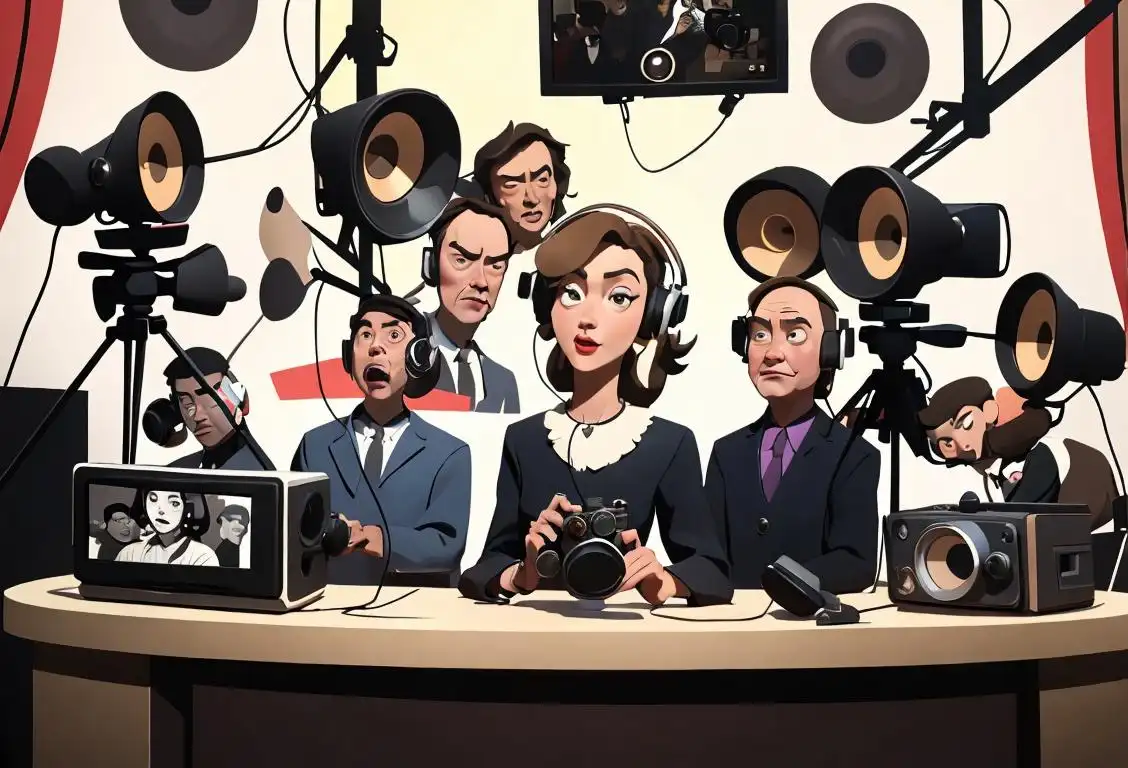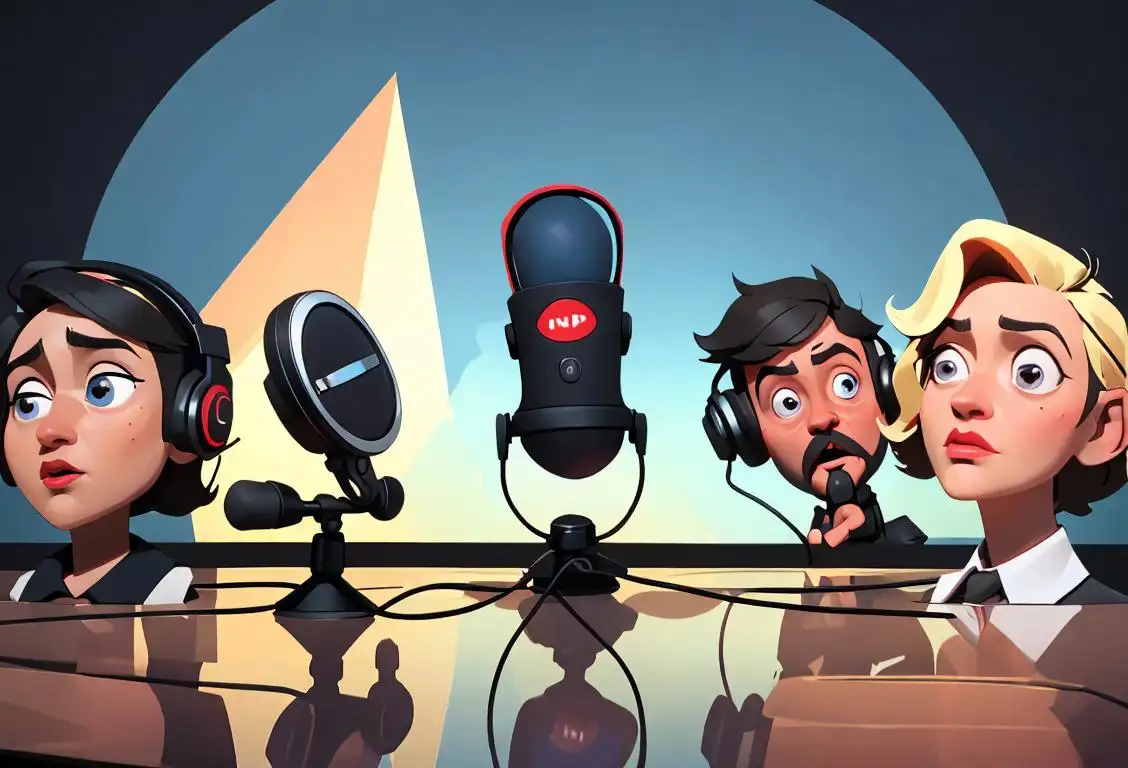National Broadcaster Day

Welcome to the wonderful world of National Broadcaster Day! Get ready to tune in to the fascinating history of broadcasting and celebrate the voices that have entertained and informed us over the airwaves. From radio to television to podcasts, let's dive into the incredible journey of this beloved medium.
When is Broadcaster Day?
It's national broadcaster day on the 26th April.
The Birth of National Broadcaster Day
Every now and then, a day comes along that celebrates something truly special. On National Broadcaster Day, we pay homage to the men and women who bring us the news, music, and entertainment we love. Whether it's through radio stations, TV networks, or digital platforms, broadcasters play a vital role in shaping our cultural landscape.
The origins of National Broadcaster Day can be traced back to the early days of radio when voices magically traveled through the airwaves and into our homes. As this medium evolved and television was introduced, broadcasters became household names, their faces and voices etched into our memories.
Fast forward to the digital age, and broadcasting has taken on a whole new dimension. Podcasts have exploded in popularity, allowing anyone with a microphone and an opinion to become a broadcaster in their own right. With such diversity in content and accessibility, it's no wonder we have a day set aside to celebrate the world of broadcasting!
Why Do We Celebrate National Broadcaster Day?
It's simple really. National Broadcaster Day gives us a chance to recognize and appreciate the hard work, creativity, and talent that goes into bringing us our favorite shows, news programs, and music playlists. Whether it's a radio host who keeps us laughing during morning commutes or a news anchor who keeps us informed during uncertain times, broadcasters touch our lives in profound ways.
Not only do broadcasters entertain and inform us, they also shape our collective consciousness. They have the power to spark debates, raise awareness about important issues, and unite communities. They capture our imaginations, transport us to new worlds, and keep us company during lonely nights. National Broadcaster Day is our opportunity to say 'thank you' to all the voices that have accompanied us on this incredible journey.
Fun Fact about Broadcasting:
Did you know that the longest-running radio show in history is the Grand Ole Opry? This iconic live country music program has been on the air since 1925, entertaining millions of listeners and launching the careers of numerous country music stars. Talk about standing the test of time!
History behind the term 'Broadcaster'
1920
Birth of Radio Broadcasting
In the year 1920, radio broadcasting emerged as a revolutionary form of mass communication. The term 'broadcaster' had its roots in this era when radio stations began transmitting signals over long distances, reaching a broad audience. Initially, these early broadcasters were mainly amateur radio operators who started transmitting music, news, and other forms of entertainment.
1922
Formation of First Commercial Radio Stations
By the year 1922, the first commercial radio stations came into existence. These stations, such as KDKA in Pittsburgh, started offering regular and scheduled programming. The term 'broadcaster' gained popularity as it became associated with individuals or organizations giving broadcasts on commercial radio stations, which allowed them to reach a wider audience than ever before.
1927
Formation of Federal Radio Commission
In 1927, the Federal Radio Commission (FRC) was established in the United States to regulate radio broadcasting. This marked a significant step in the formalization and standardization of the broadcasting industry. The FRC played a crucial role in allocating frequencies, granting licenses, and enforcing regulations. The term 'broadcaster' became linked with those who obtained licenses and operated within the guidelines set by the FRC.
1934
Creation of the Federal Communications Commission
The year 1934 witnessed the establishment of the Federal Communications Commission (FCC) in the United States. The FCC replaced the FRC and assumed greater authority over national communication networks. This transition further solidified the term 'broadcaster' as it became widely associated with entities licensed by the FCC to transmit radio signals and later television signals.
1941
Transition to Television Broadcasting
In 1941, television broadcasting took its initial steps, with a few experimental stations transmitting television signals. As the broadcasting technology evolved and television became more prevalent, the term 'broadcaster' expanded to encompass both radio and television stations. It referred to the organizations and individuals responsible for the creation and dissemination of content via these mediums.
1960
Introduction of Public Broadcasting
During the 1960s, public broadcasting gained prominence. Broadcasting entities like the British Broadcasting Corporation (BBC) and National Public Radio (NPR) in the United States, started operating as non-commercial, publicly funded organizations. The term 'broadcaster' extended to include these organizations as well, as they became essential contributors to the media landscape.
Did you know?
Did you know that the longest-running radio show in history is the Grand Ole Opry, which has been on the air since 1925?Tagged
fun entertainmentFirst identified
26th April 2020Most mentioned on
26th April 2020Total mentions
568Other days
Tv Every Day
Television Show Day
Ten Day
Tv Station Rounded Up News Session For The Day
Twilight Zone Day
Best Dick Day
Video Games Day
Sport Day
Podcast Day
Tv Day









